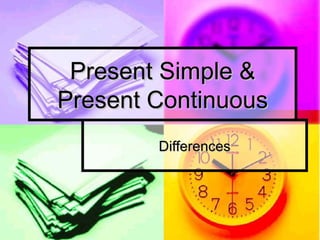
Present Simple vs Present Continuous Tenses Guide
- 1. Present Simple &Present Simple & Present ContinuousPresent Continuous DifferencesDifferences
- 2. Present SimplePresent Simple We use Present Simple to express HABITS, ROUTINESWe use Present Simple to express HABITS, ROUTINES AND TRUTHSAND TRUTHS I always brush my teeth . (Habit)I always brush my teeth . (Habit) Joaquin plays soccer every day. (Routine)Joaquin plays soccer every day. (Routine) Dogs bark (Truth)Dogs bark (Truth) Present simple can be used with adverbs like:Present simple can be used with adverbs like: always,always, often, usually, sometimes, never, every day, every week,often, usually, sometimes, never, every day, every week, every year, etcevery year, etc Ex. I always go to school.Ex. I always go to school. Ex. Robert playEx. Robert playss football every day.football every day. Ex. She usually studiEx. She usually studieses at home.at home. Do not forget the “S” “ES” with the third person -Do not forget the “S” “ES” with the third person - SHE-HE- ITSHE-HE- IT
- 3. Present ContinuousPresent Continuous We use it to show that an action isWe use it to show that an action is happening now, at the moment of speakinghappening now, at the moment of speaking Present continuousPresent continuous can be used withcan be used with words like:words like: now; at the moment; Look!;now; at the moment; Look!; Listen!Listen! E.g. I am walking to school.E.g. I am walking to school. E.g. Listen! She is singing.E.g. Listen! She is singing. E.g. He’s working at his computer now.E.g. He’s working at his computer now... Form: Subject + verb TO BE +verb-INGForm: Subject + verb TO BE +verb-ING (am/is/are)(am/is/are)
- 4. What tense is it and why?What tense is it and why? She rarely goes to the gym.She rarely goes to the gym. Look! My mom is driving a car.Look! My mom is driving a car. tefan and Drago always go to school byȘtefan and Drago always go to school byȘ bus.bus. I am drinking orange juice.I am drinking orange juice. Sometimes I do my homework afterSometimes I do my homework after lunch.lunch. Listen! The children are singing.Listen! The children are singing. They are playing badminton now.They are playing badminton now.
- 5. Now you try!Now you try! Use each verbUse each verb to make ato make a sentence in thesentence in the present simplepresent simple and a sentenceand a sentence in the presentin the present continuous!continuous! playplay drinkdrink runrun swimswim makemake gogo Example:Example: - We usually- We usually playplay tennis in the afternoon.tennis in the afternoon. - We- We are playingare playing tennis now.tennis now.
- 6. Present Simple or Continuous?Present Simple or Continuous?
- 7. He………… playingHe………… playing football.football. lovesloves is lovingis loving lovesloves
- 8. Peter………………. now.Peter………………. now.is readingis reading readsreads is readingis reading
- 9. James ………… his dogJames ………… his dog every morning.every morning. walkswalks isis walkingwalking walkswalks
- 10. At this moment JamesAt this moment James …………… for the bus.…………… for the bus.is waitingis waiting waitswaits is waitingis waiting
- 11. She always…………… anShe always…………… an umbrella.umbrella. carriescarries isis carryingcarrying carriescarries
- 12. He ………… with his fireHe ………… with his fire truck before going totruck before going to playsplays is playingis playing playsplays
- 14. Action verbsAction verbs describe actions ordescribe actions or things that happen.things that happen. For example play,For example play, go, talk, move,go, talk, move, study, etc.study, etc.
- 15. State verbs describeState verbs describe states rather thanstates rather than actions. They are rarelyactions. They are rarely found in continuousfound in continuous forms. For exampleforms. For example want, hate, know,want, hate, know, believe, etc.believe, etc. These include:These include:
- 16. EmotionEmotion like, dislike, adore, hate, love,like, dislike, adore, hate, love, needneed PossessionPossession belong, own, havebelong, own, have SenseSense see, hear, smell, feel, tastesee, hear, smell, feel, taste Thought and opinionsThought and opinions agree, disagree, believe, forget,agree, disagree, believe, forget, remember, suppose, doubt,remember, suppose, doubt, know, think, wishknow, think, wish
- 17. Both state and actionBoth state and action havehave have (stative) = ownhave (stative) = own I have a carI have a car have (dynamic) = part of anhave (dynamic) = part of an expressionexpression I’m having a party / a picnic / aI’m having a party / a picnic / a bath / a good time / a breakbath / a good time / a break
- 18. seesee see (stative) = see with yoursee (stative) = see with your eyes / understandeyes / understand I see what you meanI see what you mean I see her now, she’s just comingI see her now, she’s just coming along the roadalong the road see (dynamic) = meet / have asee (dynamic) = meet / have a relationship withrelationship with I’m seeing Robert tomorrowI’m seeing Robert tomorrow
- 19. TasteTaste (also:smell, feel,look)(also:smell, feel,look) taste (stative) = has a certaintaste (stative) = has a certain tastetaste This soup tastes greatThis soup tastes great taste (dynamic) = the actiontaste (dynamic) = the action of tastingof tasting The chef is tasting the soupThe chef is tasting the soup
- 20. ThinkThink think (stative) = have an opinionthink (stative) = have an opinion I think that coffee is greatI think that coffee is great think (dynamic) = consider, havethink (dynamic) = consider, have in my headin my head what are you thinking about? I’mwhat are you thinking about? I’m thinking about my next holidaythinking about my next holiday
- 21. My children ____________ (like) school.like
- 22. Pauline _______________ (have) lunch at the office today. ‘s having
- 23. I ____________ (see) your problem.see
- 24. David ______________ (see) the dentist today. ‘s seeing
- 25. ________________ (you/believe) in fairies? Do you believe
- 26. I _____________ (think) you’re right. I would have done the same thing. think